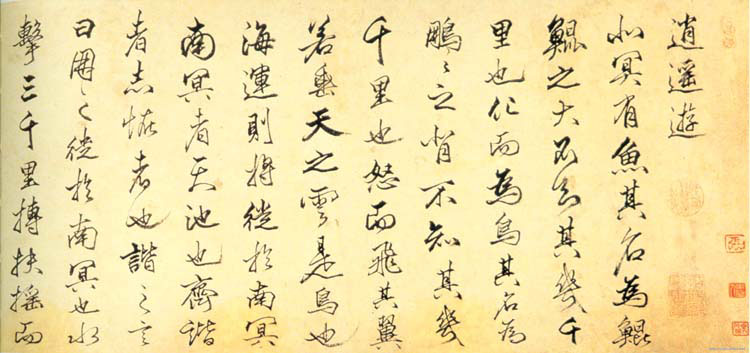Fengfang (1492-1563?) was born in Yin, Zhejiang Province in the Ming Dynasty. It was first named Fang, with the courtesy name Cunli, and later changed its name to Daosheng, with the courtesy name Renweng and Renshu. From an official position to the head of the Ministry of Rites, he is withdrawn and cynical.
The Feng family was originally a common surname in Yin County. In the past dynasties, it was an official and a famous person. Fengfang himself was erudite in craftsmanship, especially calligraphy. He owned a house of ten thousand volumes, collected tens of thousands of books, and owned more than a thousand acres of farmland. He spent all his time buying law books and stickers, and often worked day and night, copying them with his mind and hands, so he learned calligraphy. He was extremely knowledgeable and capable of all five physical skills. In his later years, he even fell into a state of addiction to calligraphy and ink. Huang Zongxi's "Farewell to Fengnan Yu" once gave a very vivid description of him: "When I read and read, my pupils dropped half an inch from the socket. People have their own ways, and they don't know it." Fengfang was not good at managing the family and finances, so the family's wealth later declined. All was lost, and six out of ten Song Dynasty manuscripts and manuscripts in the Wanjuan Tower collection were stolen by his disciples. Later, they were unfortunately destroyed by fire, so there are not many good copies left. Fengfang originally had a close relationship with Fan Qin of Tianyi Pavilion. In the early days, Fan Qin had copied books from Wanjuan Tower, and Fengfang also wrote "Tibetan Secretary" for Fan Qin. Therefore, all the remaining books from Wanjuan Tower were sold to Tian A pavilion is a matter of course. What makes Fengfang "notorious" in the history of book collection is that he has forged many "ancient books". For example, the stone version of "He Tu", "Lu Shi" and "Da Da Xue" were falsely claimed by Fengfang as being obtained by his ancestor Qing Mingong from the Secret Mansion during the Northern Song Dynasty; there are also "Shangshu" of Korea and "Shangshu" of Japan, which lie that they are His great-grandfather Fengqing got it from the post house. Wu Zhuo's "Xiu Gu Ting Xun Xi Lu" commented: "His writings are deceptive, and his calligraphy and calligraphy are so fluent that they can be handed down to the world." Quanzu looked at the "Tianyi Pavilion Collection Secretary" and ridiculed it as "making fun of scholars and deceiving later scholars." . From a modern psychological point of view, Fengfang relies on his talent and is arrogant but fails to recognize his talent. As a result, he is cynical, carefree, and arrogant about the past and present. In addition, he "suffers from heart disease late in life", so it is inevitable that he will deliberately do something that he thinks is shocking. Common things come. Unfortunately, he fell into poverty in his later years, suffered from poverty and illness, and even lived in Xiao Temple and died in a monk's house, which is a pity.
Fengfang was good at using dry brushes, and his wrist was strong, but his charm was a little lacking. At that time, Zhan Jingfeng commented on his calligraphy: "He is capable of all five styles. Since the Wei, Jin and other dynasties, all the masters have mastered the rules and regulations. The ruler comes from the hand, and the work is done by writing." That's why his calligraphy has great strength but lacks special charm." He is especially good at cursive calligraphy, seal cutting, and landscape painting. Author of "Shu Jue". The poem "Xiaoyaoyou" was written by a friend during the Jiajing period. It is naturally beautiful, Confucian and unconventional, and is a "muscular book" with many bones and little flesh.

Part of the poem "Xiaoyaoyou"








